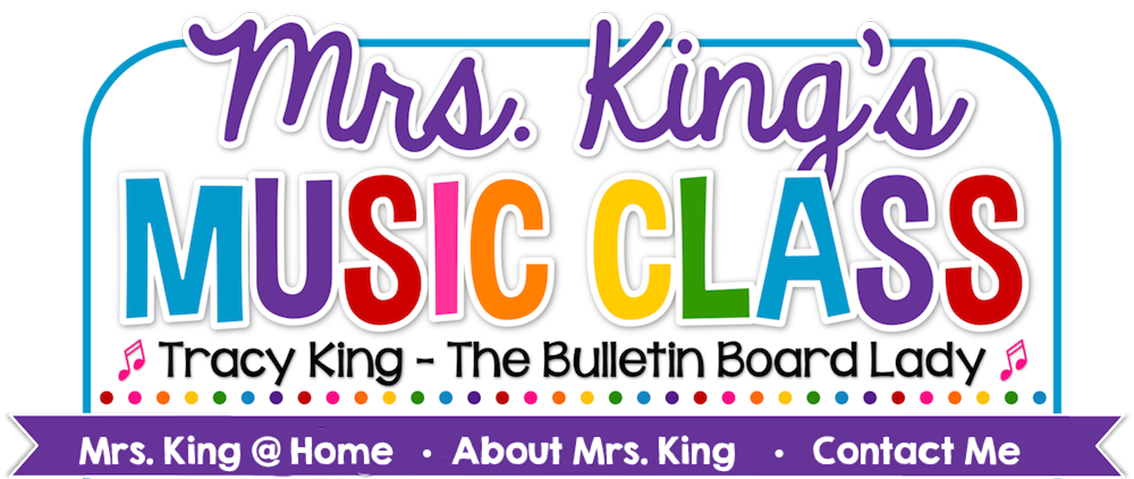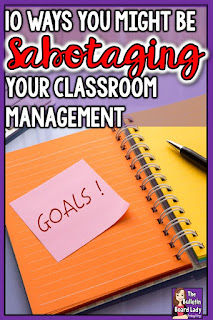Why does classroom management seem to come easily to others while you are still struggling? Why don’t the brilliant plans you read about work for you? Why are you so stinkin’ exhausted at the end of every school day? You might just be sabotaging your classroom management plan and not realize it.
Here are a few things to think about if you are struggling with classroom management.
Jumping in Without a Plan
Remember
that old saying “Look before you leap!”?
That is good advice for classroom management too. If you are starting your school year or semester
without a plan for managing your classroom, you will end up struggling with it
the entire time.
Think about classroom procedures, how you will redirect students that are off-task, what attention getting signal you will use and what you’ll do when a student is out of control. Write it down. Thinking about it is a great start but write it down so that you have a reminder for your students and for yourself.
Think about classroom procedures, how you will redirect students that are off-task, what attention getting signal you will use and what you’ll do when a student is out of control. Write it down. Thinking about it is a great start but write it down so that you have a reminder for your students and for yourself.
Being Inconsistent
It
is hard for students to know what behavior is acceptable if you aren’t consistent
with what you are telling them. If it is
not okay for students to interrupt your lesson to ask to go to the restroom,
but someone does, and you let them go, smile and then continue your lesson, your
students will assume that it is okay.
When
I first started teaching being consistent was exhausting. Why?
Because I had rules for every single thing and I was running around like
a crazy woman trying to enforce them. After
much reflection (and too many headaches) I realized that I just didn’t care
about some things and I could let them go.
For example, I don’t mind if students are chatting during workstations
or center time. If they are working and
completing their tasks, I WANT them to have conversations about that
learning. I don’t care if they get up
and get a Kleenex without permission or if they sharpen their pencil when it
needs it as long as they aren’t disruptive. I used to have a rule for all of those things and I didn't really want to enforce them.
Now
I have three classroom rules and my life is easier: Respect yourself. Respect others. Respect the property of all. This allows me to be more relaxed AND more
consistent.
A
great mentor can make you a better teacher, but what works for them may not
work for you. Don’t get bogged down by
trying to imitate every great idea you see someone else do. Find what works for you.
Laughing a Little Too Much
I
like to laugh, and I like kids. I
especially like funny kids. Sometimes I
find it difficult not to smile or laugh when kids say something to get us off
track. Laughing too much or smiling and
chasing those off-topic rabbits can derail a lesson. Use quick phrases to keep it light to refocus
your group before you have to hear twenty funny cat stories. I use statements like “Great story! Let’s get back to Beethoven now.” or “Thanks for making me smile. You know what else makes me smile? Music
theory!”
Not Taking it to the Hall
Guilty.
On occasion I have corrected a student
in public rather than taking it to the hall.
This can be embarrassing for the student and is not a good way to
prevent this behavior from happening again. It can build resentment toward you and others. Always try to correct a student in a private way if possible. Speak quietly to them at their seat or call
them to your desk. Ask them to step outside
of your classroom and chat with them there if possible.
When
directing large groups or rehearsing intensely I will pause and say “David,
please see me after class. I need to talk
to you.” Although this is a signal to
David to stop the behavior I’ve noticed, it doesn’t let others know what’s going
on unless they noticed it too. I often
have students stay after class for positive reinforcement, treats from the
goody box or personal messages of encouragement.
Being Front and Center
Getting Emotional…In the Bad
Way
Music
is such a passionate thing. Sometimes it
gives me goosebumps or brings a tear to my eye. Students are passionate too. Sometimes they give me goosebumps or bring
tears to my eyes. Sometimes they make me
want to stomp and scream! Your
students know when you are frustrated or upset.
Don’t let it get out of hand.
Take a break. Sip some
water. Breathe.
Be
honest with them. Plenty of times I have
a heart to heart with them and say “I really want to try this activity again
because it is a great way to learn *insert whatever skill we are working on*
but it is too loud and too chaotic. I
don’t feel like everyone can learn and I’m getting frustrated. Let’s talk about what we can do to make it
better this time.” It
works more often than not and gives me a chance to sit down and use a quiet,
calming voice.
Decorating a Classroom
without the Students in Mind
I
see my students once a week for 50 minutes.
They are in my room less time a week than they are in the
restrooms! So for many years I decorated
for myself. I used colors and themes
that I liked because I was the only person that had to be in the room all day long every day.
When
I started decorating with my students in mind I created rooms that were bright
and colorful, but not dripping with text everywhere. Some students are overwhelmed and will spend
their entire class time reading your walls.
Keep it simple and useful.
When
I thought more about what my students needed in my classroom I added flexible
seating options for centers, an easy access point for getting supplies and positive
messages for them to read and reread on the walls. If you are interested in learning more about
setting up your room you might enjoy this blog post: Questions to Ponder as You Set Up Your Music Room
When
kids are angry, embarrassed, scared or frustrated they can say some pretty mean
things. It is a symptom. Something is going on. Maybe it is something you can see: They aren’t
understanding what you are working on, they are being picked on or they have a
physical need that isn’t being met. Yes,
they could be hangry or uncomfortable. Maybe it is
something you can’t see like the big fight mom and dad had last night. Don’t take it so personal. Be professional. Move on.
This isn't to say that you should allow them to be disrespectful. Speak to them privately if needed. Then move on.
Not Making it Personal
I
know I just said not to take things so personal, but this tip is for your
relationship with the kiddos. Get to
know them. Smile at them. Ask questions. Help them make connections. As a specialist I feel like this one is hard. I see students for such a short time each
week and there often isn’t time to chat as we cram in curricular and
performance goals.
To combat this I go out of my way to
chat with them before school in the hall, at lunch or recess or any other duty
I may be assigned. Students need to know
you care in and out of the classroom.
This helps classroom management issues disappear. Seek out that attention stealing student and
start a conversation. Compliment that
shy student when you see them in the morning.
Make connections.
If you are a new teacher or a veteran teacher looking to up their game, you might enjoy this blog post too: Advice for the New Music Teacher. You can do this.
If you liked these ideas for classroom management PIN them for later!



